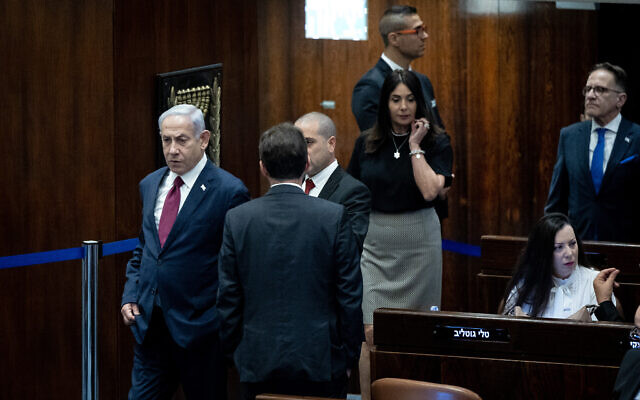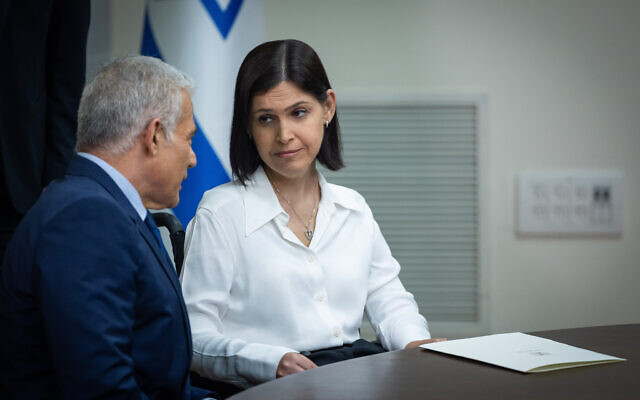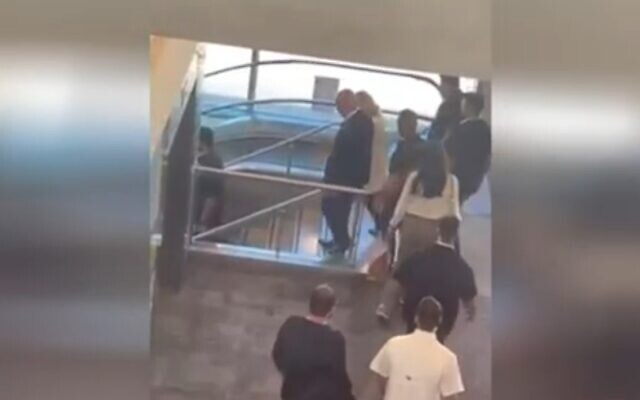Dear Times of Israel Community members and Daily Edition readers,
(We’re sending this week’s ToI Community Update to all Daily Edition readers as well. If you’re not yet a Community member, join up here and you’ll receive this personal update every week.)
At the end of a spectacularly tense day in the Knesset, and a vote count that lasted a nail-biting two hours, members of Prime Minister Benjamin Netanyahu’s coalition on Wednesday helped elect an opposition candidate to the panel that selects Israel’s judges, while overwhelmingly opposing its own candidate for the panel’s second slot. That outcome makes no sense whatsoever — except in the upside-down, highly unstable world of current Israeli politics.
The narrow election of Yesh Atid’s Karine Elharrar to the Judicial Selection Committee may have temporarily staved off a wave of intensified nationwide protests against the Netanyahu government’s planned judicial overhaul, and could turn out to have prevented the total collapse of talks under the aegis of President Isaac Herzog on alternative proposals for judicial reform. But it could also have the opposite effect.
As of Wednesday evening, the coalition’s defeat was prompting renewed calls from some of the many hardliners within its ranks to scrap the current judge selection formula altogether, and instead enact the temporarily suspended legislation that would remake the entire process by which Israel chooses its judges, giving almost complete control over judicial appointments to the ruling majority.
The already slim chances of eventual coalition-opposition consensus on constructive change in the governance of Israel — agreement on the enshrining of basic rights, perhaps even the framing of a constitution — were not enhanced by the day’s events. But whether the vote will come to signal the beginning of the end of Israel’s most hardline coalition, or, to the contrary, yield a renewed bid by its most radical members to shape Israel in their image, only time will tell.

Prime Minister Benjamin Netanyahu attends a vote on the judicial selection panel in the Knesset, June 14, 2023. Tally Gotliv MK is seated at right. (Yonatan Sindel/Flash90)
In theory, Wednesday’s proceedings ought to have been relatively mundane. The Judicial Selection Committee comprises three Supreme Court justices, two members of the Israel Bar Association, two government ministers, one coalition Knesset member and, generally, one opposition MK. Opposition parties entered the Herzog-overseen talks at the end of March on the understanding that this arrangement would be maintained, and Netanyahu signaled in recent days that he would indeed be supporting the selection of one coalition member and one opposition member.
In the event, however, several coalition members announced their candidacies for the committee alongside Yitzhak Kreuzer of the far-right Otzma Yehudit party — which had been promised the slot in the Netanyahu coalition agreements. And right-wing pressure mounted on Netanyahu to change course, back two coalition candidates and leave the opposition with nothing.
Elections for the Israel Bar Association are due next week, and Justice Minister Yariv Levin and others at the forefront of the overhaul bid may have hoped that those elections will yield another two likeminded committee members, ultimately giving the “reformers” control of the judicial selection panel in its current constellation and negating the need for a legislated remake.
Wary of defying his hardline allies but wary too of igniting fiercer protests, precipitating the failure of the president’s talks, and further dooming his White House invite prospects, Netanyahu did what he often does — tried to delay the moment of truth. When his own Likud MK Tally Gotliv refused to follow his directive and stand down as other coalition candidates had done, he told his bloc’s MKs to vote against both Elharrar and Gotliv — candidates need more “for” votes than “against” in order to be elected — and thus to prevent any panelists from being chosen.
That gambit failed. Rather than the 2-0 pro-coalition result that the hardliners wanted, or the 1-1 vote that Netanyahu and opposition leaders may previously have thought they were heading toward, the day ended with a 1-0 victory for the opposition.

Yesh Atid head Yair Lapid (left) with MK Karine Elharrar during a joint press conference in the Knesset, on June 14, 2023. (Yonatan Sindel/Flash90)
The result marked a humiliation for Netanyahu, who gave ground to the far-right but failed to impose coalition discipline either on Gotliv or on the handful of coalition members who helped lift Elharrar into the committee.
But the opposition’s “victory” was somewhat hollow, too. Without a coalition MK being elected, the judicial selection committee cannot be convened. Citing this, opposition leaders Yair Lapid and Benny Gantz announced on Wednesday evening that they would suspend their participation in the presidential talks until the committee is functional. And this, in turn, triggered calls from within the coalition to revive the suspended legislation that would give it near-total control of the panel — thus politicizing judicial selection — and radically constrain the powers of the High Court.
Whether the coalition has the votes to pass that legislation, which sits ready for its final readings at the prime minister’s pleasure, is an open question. Netanyahu suspended the bill in late March amid coalition jitters that followed his intemperate firing of his own Defense Minister, Yoav Gallant — a move he later reversed.
Karine Elharrar is a Knesset member who commands considerable respect in the House, but the handful of coalition members who backed her on Wednesday were signaling wider disquiet with their own government, its direction and its leader.

Prime Minister Benjamin Netanyahu filmed escorting his wife Sara at Ben Gurion Airport, from where she was flying to London, as the Knesset finished counting votes in elections for the Judicial Selection Committee, June 14, 2023 (Channel 12 screenshot; used in accordance with clause 27a of the copyright law)
As the vote count was concluding, Netanyahu was filmed at Ben Gurion Airport, escorting his wife Sara, who was flying to London in order to be present in the room when a key witness in Netanyahu’s corruption trial, Arnon Milchan, testifies from there via video feed in the next few days.
The conflation of the two scenes — the confirmation of the coalition’s defeat in the Knesset and the prime minister’s need to be elsewhere to deal with his legal battles — underlined the strains under which he is operating, in a nation torn and troubled under his leadership.
Israel Story: ‘Herzl 48 Live’
Theodore Herzl was the father of modern Zionism, and there are 54 streets named after him in Israel — more than any other national figure. In this week’s episode from ToI partner Israel Story, we visit every 48 (for 1948, Israel’s founding year) Herzl Street in the country and collect the stories from those we encounter. Click or tap below to hear the podcast:

This episode is from the Israel Story archives (December 2015).
** Israel Story is produced in partnership with The Times of Israel
What Matters Now to security expert Jonathan Spyer: Heating up of Iran’s confrontations with enemies

This week on ToI’s What Matters Now, we speak with Dr. Jonathan Spyer, the director of research at the Middle East Forum and editor of Middle East Quarterly, and discuss new alliances threading through the Mideast as Syria is re-embraced by the Arab League and Iran signs accords with Saudi Arabia, UAE. Listen to What Matters Now
🔔 And be sure to subscribe to What Matters Now on Apple Podcasts, Google Podcasts, Spotify, or wherever you listen to podcasts.
🙋 Have something to share?
We’d love to hear it! Join the discussion on our active ToI Community Facebook group. Keep tabs on new content and events on our Community Page. And please don’t hesitate to write to us with any suggestions, issues or questions.
Thank you for your continued support of our independent journalism.
~ The Times of Israel Team
![]()
![]()